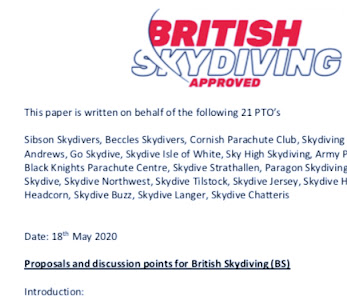Full members pay subscriptions of £100 per year, of which £40 is said to be for insurance. 6,400 members would pay the BPA £640,000 in membership subscriptions. After deducting £40 per member for insurance, this would leave the BPA holding £384,000. According to a paper published in May 2020 by an alliance of twenty-one of the twenty-nine BPA-affiliated Parachute Training Organisations, the BPA receives £18.74 for each Student Provisional Membership processed by the BPA-affiliated PTOs. The authors of the PTO paper state that £11.23 of this figure is for insurance.
Taking the BPA’s student membership figures as the denominator, this suggests that the BPA receives £1,124,400 a year, of which the firm apparently retains £450,600 after the insurance premiums for each student skydiver are paid. According to BPA Ltd’s most-recently filed Annual Statement in June 2019, the BPA’s temporary membership-related income was £4,066 or around 1% of the net amount retained by the BPA in respect of Student Provisional Memberships.
In her Statement of Council’s Responsibilities, dated October 1st 2019, long-serving BPA Treasurer Debbie Carter wrote: “The Council is also responsible for safeguarding the assets of the Association and hence for taking reasonable steps for the prevention and detection of fraud and other irregularities.”. However, former BPA directors and Council members say that they were unable to find out who insures BPA Ltd and how much the premiums are.
Taking the BPA’s own full and temporary membership figures as denominators, the membership subscriptions would have comprised £256,000 for the 6,400 full members and £673,800 for student or temporary members. The total of £929,800 is rather higher than the £739,542 BPA Ltd received for insurance in 2018-2019, according to the Annual Statement signed off by Deborah Carter.
In the same statement, BPA Ltd declared an expenditure on insurance of £740,728 against the £739,542 received. In other words, the BPA accounts suggest that the firm loses money on insurance. Four different insurance brokers in London suggested that the annual insurance premium should be in the region of £500,000. If this is the case, then BPA Ltd are either overpaying or cooking the books.
During the financial year 2018-2019, BPA Ltd spent £542,424 on staff and operating costs. The operating costs were £208,975. Senior BPA management figures say that a large part of this figure involves payments to the Civil Aviation Authority. A perusal of the CAA Scheme of Charges indicates that the BPA ought to be paying around £180,000 a year to the CAA. Put another way, the CAA ought to be collecting around £180,000 a year from BPA Ltd on behalf, essentially, of the British taxpayer.
According to sources within the CAA, the CAA collects around £30,000 per annum from the British Parachute Association. As of June 30th 2019, BPA Ltd held an “Accumulated Fund” containing £3,128,674. To this figure, the firm added its “surplus’ for the year of £49,801, bringing what some BPA directors have described as the Association’s “rainy day fund” to a total of £3,178,475, which is quite remarkable for a “not-for-profit sports association”.
 |
| CAA CEO Richard Moriarty |
If the BPA were banking an annual surplus of £50k or its equivalent over the past few decades thanks to thrifty management and accounting, it would have taken the firm more than seventy years to accumulate its £3 million-plus cash holdings. The BPA was founded in 1960 and incorporated in 1966. However, if it is true that the CAA has been undercharging the BPA by around £150,000 a year, it would take twenty to twenty-five years to accumulate £3 million. The BPA has represented the CAA since 1996.
Former BPA Council members who say they were subjected to constructive dismissal tactics after requesting detailed breakdowns of the firm’s accounts, including insurance premiums and operating costs, have referred to an £800,000 hole in the BPA accounts. The June 2019 Annual Statement refers to “creditors’ who owe the firm £898,800. BPA insiders suggest that these creditors are senior BPA directors who benefit from unsecured, interest-free ‘loans’. Newly appointed BPA Treasurer Natasha Higman did not respond to emails asking about this. Nor did outgoing BPA Treasurer Deborah Carter.
BPA spent £24,865 on “instructor training” and a further £2,129 on “safety”, which goes some way to explaining the fatalities and life-changing injuries suffered by BPA skydivers as a consequence of sloppy safety procedures and the BPA’s endorsement of highly dangerous activities like canopy piloting as tacitly expressed by BPA Chief Operating Officer Tony Butler at the inquest into Aiden Chaffe’s death in 2018.
On the face of it, the British Parachute Association appears to be a fairly profitable enterprise for the small cabal of individuals running the firm rather than the not-for-profit sports association it claims to be. Most of the directors sitting on the governing Council have little in the way of any effective executive power and, as the turnover of more than a hundred directors over the years indicates, anyone who challenges the ruling cabal is quickly eased out.
 |
| BPA COO Tony Butler: not listed as a director |
Some critics accuse the Civil Aviation Authority of complicity in the BPA’s obvious strategy of establishing a monopoly over sports parachuting in the United Kingdom. The BPA uses various methods, which British Parachute Association Watch will be investigating in future instalments of this blog.
These methods are said to include making it impossible for any club or organisation offering affordable entry-level parachuting to remain in business. The BPA is said to use various forms of intimidation including threats to cancel the BPA memberships and BPA instructor qualifications of any individuals or groups who displease BPA COO Tony Butler and his cronies. The BPA seems to be assisted in its aims by a government-appointed quango that prices any non-BPA-affiliated organisations out of the marketplace by overcharging them––whilst charging the BPA less than 20% of what it should be paying.
Roman Kandells








No comments:
New comments are not allowed.